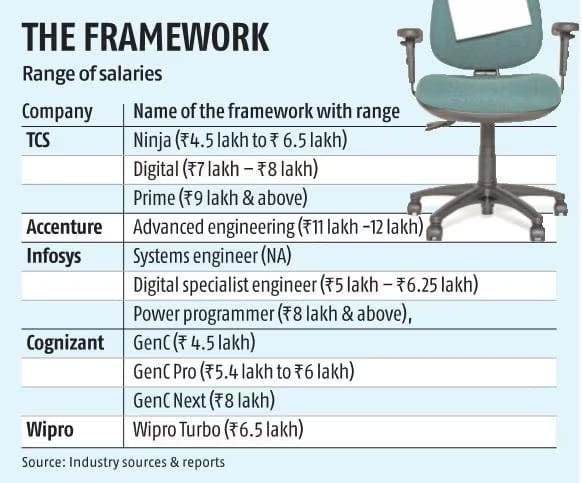Top IT Services Companies Embrace Tiered Hiring Strategy: Unlocking Talent Potential
Freshers hired through this plan get better pay, greater retention and growth

In the ever-evolving landscape of IT services, a strategic shift is underway—one that promises to redefine how companies attract and retain fresh talent. Enter the tiered hiring strategy, a game-changer that aims to bridge the gap between entry-level hires and competitive salaries.
The Genesis of Tiered Hiring
The Talent Drain Not long ago, IT services giants like Tata Consultancy Services (TCS), Accenture, Infosys, Wipro, Cognizant, and Capgemini faced a common challenge: losing promising freshers to multinational corporations (MNCs). The solution? A tiered approach that assesses and categorizes engineers based on skills, allowing companies to tailor compensation packages accordingly.
From Vanilla to Digitization A decade ago, IT firms primarily engaged in “plain vanilla” hiring—recruiting engineers for standard application development roles (think Java, Testing, SAP, or Oracle). However, as digitization gained momentum, clients demanded more specialized skills. Enter the need for a revamped strategy.
The Tiered Framework Unveiled Companies began reevaluating their hiring practices. Tier-I colleges became a focal point, but securing day-one placement slots proved elusive. Within the same campus, varying cutoffs based on rigorous tests identified top-tier candidates. Meanwhile, global capacity centers, startups, and MNCs intensified the competition.
The High-Stakes Talent Battle These external players offered higher salaries—up to Rs 7 lakh—to freshers, luring the cream of the crop away from traditional IT services. To counter this, companies devised a differential salary structure, rewarding select freshers with salaries ranging from Rs 6.25 lakh to Rs 12 lakh per annum.
AI and New-Age Technologies: The Catalyst
The Slow Lane and the AI Focus While campus hiring slowed down, the tiered framework gained prominence. Why? Artificial intelligence (AI) and cutting-edge technologies took center stage. As clients demanded advanced skills, IT firms adapted, creating a talent pipeline that aligned with the digital era.
The Benefits of Differential Salaries
- Employee Stickiness: Freshers hired through this funnel exhibit greater loyalty, with attrition rates dropping by 8–10 percent.
- Clear Growth Trajectory: These freshers enjoy a well-defined career roadmap, fostering motivation and commitment.
The Numbers Speak
The 20–30 Percent Impact Although launched in 2019-2020, the tiered structure already accounts for 20–30 percent of total fresher hiring. Companies recognize its value in securing top talent.
VIT’s Success Story At VIT Vellore, Accenture’s offers for Advanced Engineering roles tell the tale: 181 offers in 2024, 201 in 2023, and 289 in 2022—all with attractive packages.
The Future: 30:70 Ratio As the market evolves, expect the focus to remain on tiered hiring. The current 30:70 ratio will likely shift, reflecting the changing landscape.
In summary, tiered hiring isn’t just a trend—it’s a strategic imperative. By recognizing talent potential, companies can stay ahead in the race for skilled professionals, ensuring a win-win for both freshers and organizations.

Stay tuned, to PropleManager.co.in for further updates on the evolving workplace paradigm.
Value our content… contribute towards our growth. Even a small contribution per month would be of great help to us. Since our establishment, we have been serving the industry through daily news and updates.
Our content is free for all, and we plan to keep it that way
Support the People Manager. Pay Here
- FUJITRANS Corporation names Vinay Tanwar as Head – HR, India - January 16, 2026
- Duroflex Group Appoints Arkadeb Chakraborty as Chief HR Officer - January 16, 2026
- CEAT Limited Appoints Rahul Gama as SVP – Human Resources - January 16, 2026








